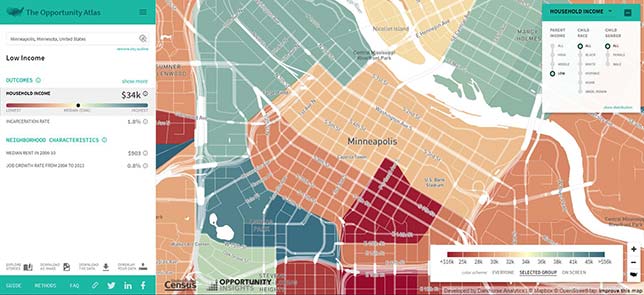Detailed Picture of 'Inequality of Opportunity' Emerges
- By Dian Schaffhauser
- 11/05/18

Where kids grow up has a big impact on how well they'll do as adults. While that may sound obvious, a new program that brings together economists from Harvard University and Brown University and researchers from the U.S. Census Bureau has found that kids who grow up in the same community just miles apart end up with very different futures.
The project will use census tract-level data to develop scalable policy solutions that could enable families throughout the United States to rise out of poverty and achieve better life outcomes. Harvard's Raj Chetty and Nathaniel Hendren and Brown's John Friedman will be co-directors of the project.
The work is being funded through grants from the Bill and Melinda Gates Foundation and the Chan Zuckerberg Initiative, with additional support from the Overdeck Family Foundation, the Robert Wood Johnson Foundation and Bloomberg Philanthropies.
Opportunity Insights, as the initiative is called, will use big data and advances in scientific research to work with collaborators in improving "the lives of Americans in communities across the country," according to Chetty, the inaugural William A. Ackman Professor of Public Economics at Harvard.
A big part of the work involves the Opportunity Atlas, a freely available online resource produced with help from the U.S. Census Bureau. The atlas provides data on children's outcomes in adulthood for every Census tract in the United States. The interactive map uses the adult earnings of 20.5 million children born between 1978 and 1983 and drawn from anonymous, individual-level census and tax data that ties each child to his or her parents. It also examines incarceration rates for the neighborhoods in which children grew up, based on a data snapshot taken on April 1, 2010. Even though the data reflects the outcomes for people who are now in their 30s, the research project believes the outcomes hold true for children growing up today as well. This tool is intended to help people look within their cities to understand where opportunity exists and how each neighborhood shapes a child's future economic and educational success.
As Gates Foundation CEO Sue Desmond-Hellmann explained, with the use of the atlas, "policy makers, public officials and parents will have an unprecedented chance to look at their community and understand better how each neighborhood shapes a child's future economic and educational success, where opportunity exists and the places where strategies to increase opportunity are needed."
The new program builds on the successes of the Equality of Opportunity Project, a previous research partnership focused on understanding the hidden forces influencing the achievement of upward mobility. The work done in that project showed that children's chances of earning more than their parents did has declined from 90 percent to 50 percent over the last 50 years. That collaboration resulted in creation of the CLIMB Initiative, an alliance with 300 colleges and universities to identify the higher ed policies and programs that could help more students achieve economic success.
The new effort, which is hoping to find ways to "revive" upward mobility for present and future generations, goes beyond sheer research. A dedicated team will work with policy makers and practitioners to increase equality of opportunity in their own cities and towns. Policy partnerships have already been set up in Seattle; Charlotte, NC; Minneapolis; and Detroit, with plans underway to expand to additional cities.
"Our work suggests that neighborhoods are where the next generation is shaped. If you want to improve kids' outcomes in adulthood, go to the places where they grow up. That's where you can change the trajectory," said Hendren, a professor of economics. "When we work with local partners, they have a better sense of what approaches might work in their area. Our work reveals where children struggle the most. The power is in merging the two together."
The cities will receive the research and "analytical support" needed "to ask and answer the questions that matter most and create impactful policies and programs to fight poverty and increase local opportunity," explained David Williams, head of the policy team.
The job of city decisionmakers will be to take the data and determine which factors would "best help families make and sustain a move," added Greg Russ, executive director and CEO of the Minneapolis Public Housing Authority.
Eventually, the new project will also work with schools, colleges, community groups, and practitioners, whoever "has the right tools to improve the outcomes of all children," said Friedman, an associate professor of economics and international affairs and public policy at Brown.
"We want to take luck out of the equation so more children across the country are able to reach their full potential," said Priscilla Chan, co-founder of the Chan Zuckerberg Initiative. "We are thrilled to support this new effort to better understand the drivers of poverty as well as solutions that can foster greater economic mobility and security for more families."
The Opportunity Atlas is openly available. Opportunity Insights offers links to research, papers and presentations.